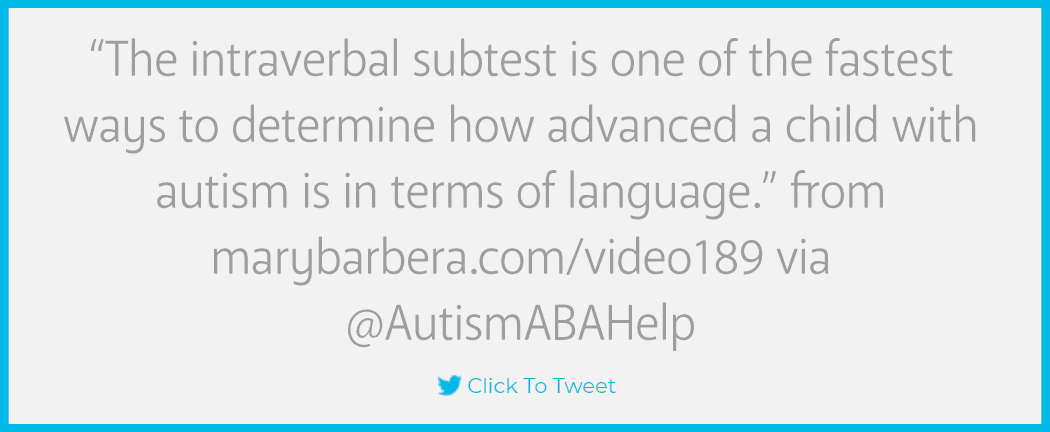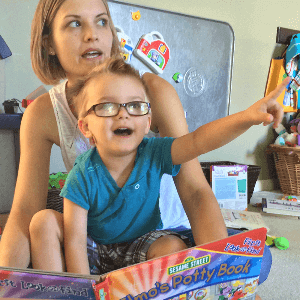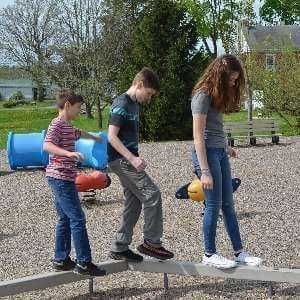High Functioning Autism: Can the Verbal Behavior Approach Help?
Supporting Individuals with Higher Language Skills
I did an independent evaluation on a student years ago that I assumed from looking at the preliminary reports had higher language skills. She was doing very well academically, supposedly, but just having these severe tantrums.
So I started asking her to tell me some animals. She was able to name a lot like horse, pig, and cow. Then I asked her to tell me some pieces of clothing. She said pants, shirts, dresses, even capris, and sandals. I was very impressed with the advanced language there. And then I said, tell me some things that are usually red.
I wanted her to say things like strawberries or stop signs. Because answering questions, like tell me some colors, tell me some animals, tell me some shapes, those are answers to the questions that she’s potentially been practicing since she was three years old. And she’s now nine. So I said, tell me some things that are usually red.
And she started looking around the room, and it was Christmas time and there was a Christmas tree up in the home and she said Christmas lights. And I said, “Oh yeah, that is red. Can you close your eyes and tell me some things that you can think of that are red?” Looking for things that weren’t in sight. And she started screaming at me, “Don’t tell me to close my eyes!” What the language is that we really need to assess quickly for these kids that have higher language skills is the intraverbals.
Intraverbals
There are four elementary verbal operants that make up expressive language. When we use verbal behavior terms, we talk about four ways or four functions of expressive language. They are to request or mand (asking for a cookie when you want a cookie), tact or label (seeing a cookie and naming it), echoic control (I say cookie, you say cookie), and intraverbal, which is answering WH questions. Intraverbals are the hardest operant. When we learn our first language, or when we learn second languages, it’s the answer part of a question with no visuals. So all of our academic content, all of our writing, all of our comprehension is all based on that intraverbal and that is going to be the weakest operant overall.
Typically developing kids don’t obtain intraverbal language until about 18 months of age. They have their mands, their tacts, and their echoics when they start to babble. Even crying for a bottle or for diaper change is a mand.
Verbal Behavior Approach
So in order to see if the verbal behavior approach is good for supporting someone with higher language skills, we need to assess their intraverbal language, their ability to answer questions.
You can do that actually pretty easily by using Dr. Mark Sandberg’s intraverbal subtests. You can go to www.avbpress.com to take it for free. From the homepage click on the resource section and then on VB MAPP Supplementary Material. There you will find the Intraverbal Subtest and instructions below it.
One thing I would do to help my friend’s student or the student I mentioned above, is I might ask him or her to just answer some questions. What’s your name? What’s your favorite color? What’s something that flies in the sky? Just to get a feel if he’s fully conversational. To see what their language is like.
Attend a FREE Workshop!
The Intraverbal Subtest
When in doubt, though, you can obtain this free intraverbal subtest. They go in groups. So group one and two are really, really simple ones. Like a kitty says, twinkle, twinkle, little…and the student says star. Those are gonna be your very early on intraverbals. Then you move on to fill in the blanks. You sleep in a… bed.
For higher language kids, you could even skip to say groups five, six, seven, and eight. Make sure that they can answer some of these questions. So group five might have questions like, What shape are wheels? What grows outside?
Group six gets a little bit harder. What color is my shirt? What do you smell with? Then groups seven and eight are super hard. Any kid over age five should be able to get 8 or 9 out of 10 of these correct. And it’s really important that you don’t teach to the test.
Asking these questions will help you determine if there are deficits in their language. Kids tend to answer fill-in-the-blank songs first. Then fill-in-the-blank sentences. Next what, where questions, and some of the harder questions like why and how. Switching out one word like, what do you eat versus what do you eat for breakfast? What do you eat for breakfast that’s warm? As you can see, it’s not just about answering WH questions. It’s about answering WH questions that get more and more complex.

Support for Advanced Language Learners
And so I’ve spent the last two decades programming for early and intermediate learners. And some of these kids with advanced language are actually intermediate learners that need a lot of help. It’s just that people don’t normally know how to help.
In general, I encourage you to really look at the intraverbals, the ability to answer questions, as one of the pivotal things you can do to assess treating kids with higher language skills.
If you would like to learn more about the Turn Autism Around Approach and get additional information about possibly joining our online course and community, you can attend a free online workshop at marybarbera.com/workshops.
Transcript
Hi, I’m Dr. Mary Barbera, autism mom, Board Certified Behavior Analyst and bestselling author. Each week I provide you with some of my ideas about turning autism or signs of autism around so if you haven’t subscribed to my YouTube channel, why don’t you join more than 55,000 people who have subscribed by doing that now?
I got a question, um, from a friend of mine who is a teacher and she said would a kindergarten student who is on the autism spectrum with severe tantrum behaviors, however he’s high functioning academically, would he be a good candidate for verbal behavior? Um, we have a kiddo in our building and I’m stumped as to how to help him.
I had another, um, independent evaluation student years and years ago. And I assumed from looking at the preliminary reports that she was quote unquote, high functioning. She was doing very well academically, supposedly, but just having these severe tantrums. So I start asking her, Hey, tell me some animals and horse pig, cow, you know, named a bunch.
Um, tell me some clothing, some pieces of clothing, uh, pants, shirts, uh, dresses, um, and she even said capris and sandals, and I’m like, that’s very high functioning sounding. And then I said, Oh honey, tell me some things that are usually red. So I was, I was wanting to get things like strawberry, stop sign, those sorts of things, because um, answering questions, like tell me some colors, tell me some animals, tell me some shapes, tell me some vehicles. Those are, those are answers to the questions that she’s potentially been practicing since she’s been three. And she’s now nine. So I said, tell me some things that are usually red. And she started looking around the room, um, and it was Christmas time and there was a Christmas tree up in the home and she said Christmas lights. And I said, Oh yeah, That is red. Um, can you close your eyes and tell me some things that you can think of that are red looking for that stop sign, strawberry things that weren’t insight. And she started screaming at me. Don’t tell me to close my eyes. Um, and so what the language is that we really need to assess quickly for these kids that we think are high functioning, but may not be is the intraverbals. Now I’m going to very, very quickly go over the four elementary verbal operants that make up expressive language. So when we talk about kids talking or kids having speech, um, when we use verbal behavior terms, we talk about there’s four ways or four functions of expressive language, and that is, is to request or mand.
So if I want a cookie, I ask for a cookie. If I need a drink, I ask for a drink, um, that’s a mand. A tact or a label, so I see a cookie or I see a drink. I don’t want it, but I label it. Um, echoics I say, cookie, you say cookie. And then the fourth operant is the intraverbal and that is answers to wh questions.
And that is going to be the hardest operant. It’s the hardest operant when we learn our first language, when we learn second languages, um, it’s the answer part of a question with no visuals. So all of our academic content, um, all of our writing, all of our, our comprehension is all based on that intraverbal and that is going to be the weakest operant across everyone.
Typically developing kids don’t obtain intraverbal language until about 18 months of age. Yet they get their mands, their tacts and their echoics, uh, soon after they, you know, when they start to babble, even crying for a bottle or for diaper change is a, is a mand. So you’re going to get your mands right away. So what we want to do with this question of trying to decide how high functioning is we need to assess their intraverbal language, their ability to answer questions, um, and you can do that actually pretty easily by, um, using Dr. Mark Sundberg’s. Intraverbal subtest. To obtain a free intraverbal subtest, you want to go to AVBpress.com and that is Mark Sundberg’s website. Um, AVBpress.com. And then you go up here to the resource section, come down to VB MAPP supplementary material, click on that.
And then you come down here to the fifth, fifth level is the intraverbal subtest. And then there’s right below that is the intraverbal subtest instructions as well. And we can link this, um, in the show notes, in the, in the comments, wherever you’re watching or listening, um, this is super important. So if you get to the point with the little girl that was freaking out about something that’s red or this kindergarten student, one thing I would do is I might ask him or her to just some questions, you know, Hey, what’s your name? Uh, what’s your favorite color? What’s something that flies in the sky just to get a feel if he’s fully conversational. What’d you do this weekend, even though I don’t know the answer to that, but just let’s see what their language is like. When in doubt, though, you can obtain this free intraverbal subtests and the, they go in groups. So group one and two are really, really simple ones. Like a kitty says, twinkle, twinkle, little star, um, itsy bitsy, spider.
Um, those are gonna be your you’re very early on intraverbals. Then it’s going to be fill in the blanks, you sleep in a bed, those sorts of things. For higher functioning kids, you could even skip to say groups five, six, seven, and eight. Um, and you could, uh, make sure that they can, uh, answer some of these questions.
So group five might have questions like, what shape are wheels? What grows outside? What can sting you? What do you write on? Name some body parts. So you can see then group six gets a little bit harder. What color is my shirt? What do you eat with? What’s above a house? What do you smell with? What are some hot things?
What’s under a boat? And then group seven and eight are super hard. So you want kids to get like, any age kid over five should be able to get eight, nine out of 10 of these, correct. Um, what makes you sad? So group seven, what makes you sad? Name some clothing. What do you do with money? What do people wear?
Why do people wear glasses? What’s something that’s sticky? And group eight, what’s inside a balloon? What’s your last name? What do you do before bed? What do, why do you wear a coat? What musical instrument has strings? And it’s really important that you don’t, um, teach to this test. So once you determin that there are deficits. Um, that is the quickest way know how to tell how, how high functioning a child is in terms of language. Kids tend to answer, answer first, fill in the blanks song. Fill-ins then they go to what, where questions and some of the harder questions are why and how, and those little words, like, what do you eat with versus what do you eat versus what do you cook on?
What do you cook with? That changes the whole answer. What do you take to the beach versus what do you wear to the beach? Um, and kids that break down with the little words and switching out one word, um, what do you eat? What do you eat for breakfast? What do you eat for breakfast that’s warm? What do you eat for breakfast that you don’t like, but your brother likes as you can see those, it’s not just about answering wh questions it’s about answering wh questions that get more and more complex. And so I’ve spent the last two decades programming for early and intermediate learners. And some of these kids that are labeled high functioning are actually intermediate learners that need a lot of help. Um, it’s just that people don’t necessarily know how to help these kids.
In general I encourage you to really look at the intraverbals, the ability to answer questions as one of the pivotal, uh, things you can do to assess that area of language, to determine how high functioning a child is and what they may need. I hope you enjoyed that small clip. If you like to learn more about The Turn Autism Around Approach and get additional information about possibly joining our online course in community, you can attend a free online workshop at marybarbera.com/workshop.
And if you like this video blog, I would love it if you would leave a comment, give me a thumbs up, share the video with others who might benefit to help me spread the word and also subscribe to my YouTube channel for additional autism videos that come out every single week. And speaking of every single week, I’ll see you right here next week.






